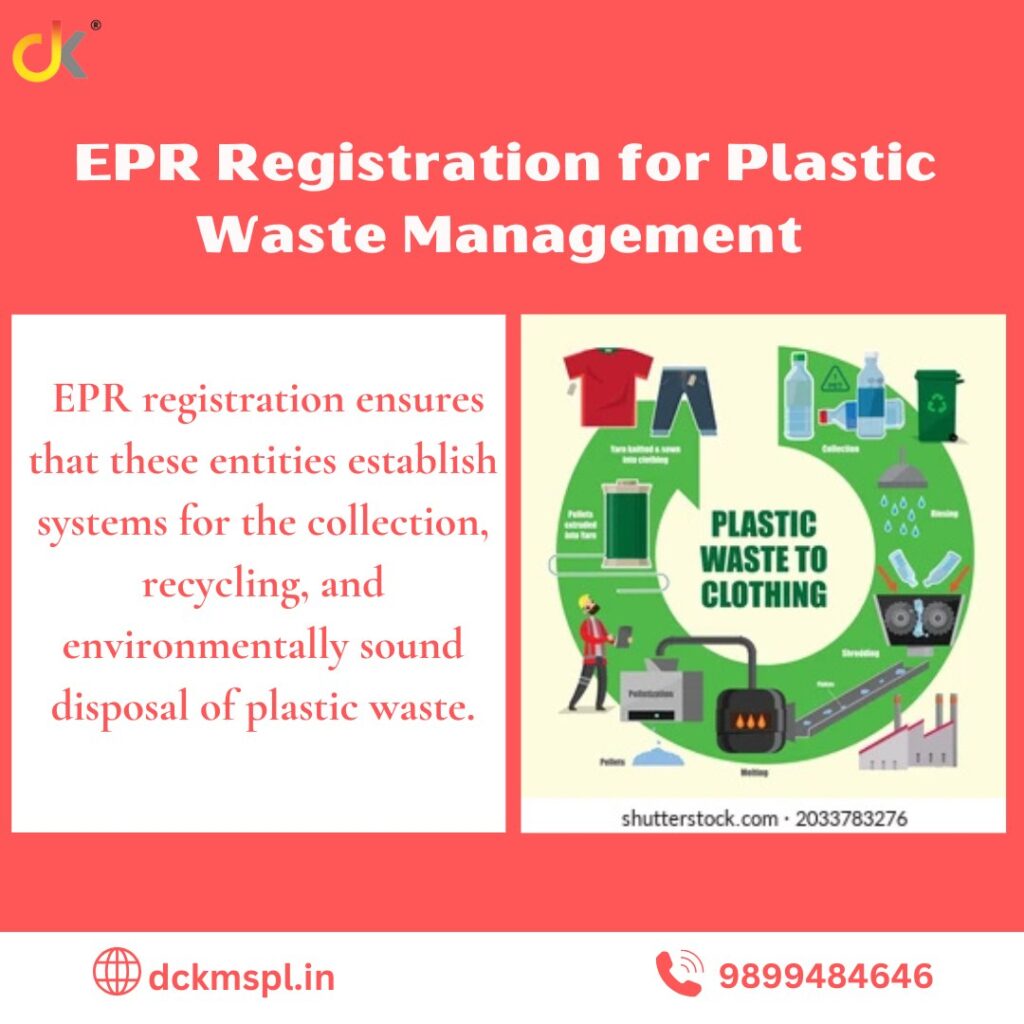
EPR registration for plastic waste management ensures that these entities establish systems for the collection, recycling, and environmentally sound disposal of plastic waste.
Plastic waste management has become a global concern due to its detrimental effects on the environment. With increasing plastic consumption, proper waste management strategies are essential to mitigate pollution and support sustainability efforts. Extended Producer Responsibility (EPR) registration is a regulatory framework that holds producers, importers, and brand owners accountable for managing the plastic waste generated by their products. This article explores the importance of EPR registration, the process involved, and the challenges and benefits of implementing this system.
Understanding EPR
EPR registration for plastic waste management is a policy approach that shifts the responsibility for plastic waste management from government entities to the producers of plastic products. The EPR framework requires companies to take charge of the entire lifecycle of their plastic products, from production to disposal. This approach incentivizes companies to adopt sustainable practices, enhance resource efficiency, and reduce the amount of plastic waste that ends up in landfills or pollutes the environment.In most countries, EPR registration is mandatory for companies that manufacture, import, or sell plastic products. By making producers accountable for managing their plastic waste, the policy encourages businesses to implement better waste management practices, thus promoting a circular economy in which resources are reused and recycled.
Why EPR Registration is Essential
- Promoting Recycling and Reuse: EPR fosters a circular economy by encouraging producers to create systems for collecting and recycling plastic waste. This approach reduces the need for virgin plastic and minimizes resource depletion.
- Ensuring Compliance with Regulations: Many governments have established strict regulations for plastic waste management, and EPR registration is often a legal requirement. Companies that do not comply with EPR regulations may face penalties, making it crucial for businesses to register and adhere to the guidelines.
- Enhancing Corporate Social Responsibility (CSR): Companies that embrace EPR demonstrate a commitment to sustainable practices and environmental stewardship. This helps improve their corporate image and build trust with consumers who are increasingly conscious of sustainability.
Steps Involved in EPR Registration for Plastic Waste Management
- Developing an EPR Plan: An EPR plan is a comprehensive document that outlines how a company will manage the plastic waste generated by its products. This plan should detail strategies for the collection, recycling, treatment, and environmentally sound disposal of plastic waste. Companies may also partner with waste management firms or recycling facilities to ensure proper execution.
- Registering with the Designated Authority: Once the EPR plan is developed, companies need to register with the relevant environmental authority. This registration typically involves submitting the EPR plan along with necessary documentation, such as product specifications and estimates of the plastic waste generated.
- Implementing the EPR Plan: After obtaining approval from the regulatory authority, companies must implement the EPR strategies. This involves setting up waste collection systems, working with recyclers, and ensuring that all activities align with the regulatory requirements.
Challenges of EPR Registration for Plastic Waste Management
- Complex Regulatory Landscape: The EPR guidelines and requirements often vary from one region to another, making it difficult for multinational companies to develop a uniform waste management strategy. Keeping up with frequent regulatory changes also adds to the complexity.
- Limited Recycling Infrastructure: In some regions, recycling facilities and waste management services may be inadequate, making it challenging for companies to meet their recycling targets. This can hinder the effectiveness of EPR programs.
- Consumer Awareness and Participation: For EPR to be successful, consumers need to actively participate in waste disposal and recycling programs. Lack of awareness about proper disposal practices can reduce the impact of EPR efforts.
Benefits of EPR Registration
- Resource Efficiency: EPR promotes the efficient use of resources by encouraging the recycling and reuse of plastic materials. This reduces the demand for virgin materials and decreases energy consumption.
- Economic Opportunities: The EPR framework can create economic opportunities in the waste management sector, including jobs in recycling, waste collection, and processing. It also stimulates the development of new technologies for waste management.
- Enhanced Corporate Reputation: Companies that comply with EPR guidelines showcase their commitment to sustainability, which can improve their brand image and strengthen relationships with environmentally conscious consumers.
Conclusion
EPR registration for plastic waste management is an essential component of sustainable development. By making producers responsible for managing plastic waste, EPR drives companies to adopt eco-friendly practices and support a circular economy. While there are challenges in implementation, the long-term benefits of reducing plastic pollution, conserving resources, and promoting sustainability make EPR a worthwhile endeavor for businesses and society.



